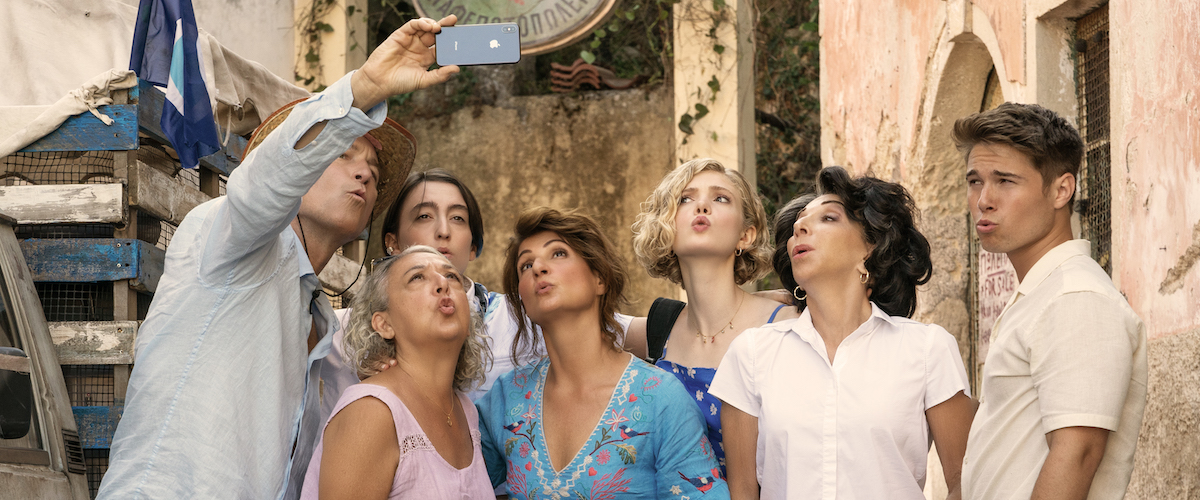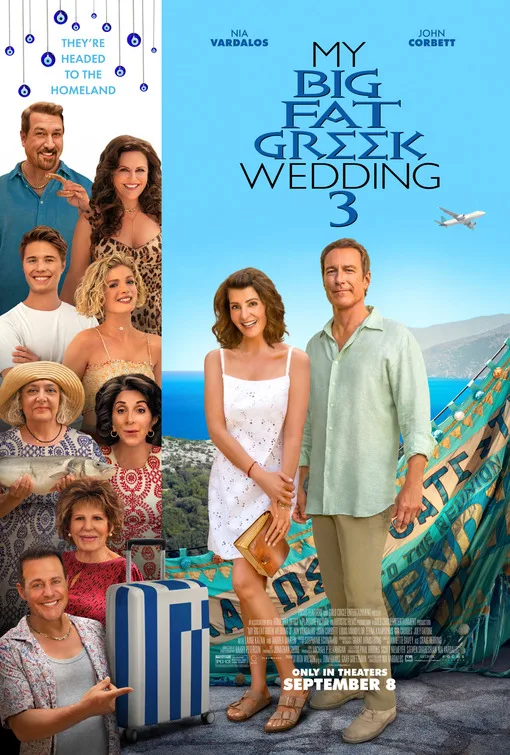The original 2002 “My Big Fat Greek Wedding” is one of the most financially successful movies ever made, in terms of cost-to-return, earning over $360 million worldwide on a $5 million production budget. Of course, there would be sequels; the only mystery is why there haven’t been five or ten by now, rather than just two. The films are formulaic, but it’s an appealing formula, like a family recipe for a comfort food dish that isn’t going to win any Michelin stars but satisfies because it reminds you of being loved and taken care of.
Despite detractors complaining that the original was a TV sitcom in cinematic drag, the concept clearly works better as a series of self-contained films than a TV show: whereas the spin-off sitcom “My Big Fat Greek Life” ran less than a full season, “My Big Fat Greek Wedding 2” was a hit, despite being released 14 years after the original, returning nearly five times its production budget. “My Big Fat Greek Wedding 3” will probably be a success as well because writer/star Nia Vardalos, aka Toula Portokalos, created the recipe and is running the kitchen now (it’s her second directorial endeavor after 2009’s “I Hate Valentine's Day“). She knows what the customer likes.
The biggest hurdle to creating another chapter in this family saga was the absence of Michael Constantine, who died at 94 after two performances as the Portokalos family’s gruff, impulsive, but bighearted patriarch, Gus. Vardalos follows the path of many smart franchise filmmakers who have to deal with the death of a primary cast member and leans into the immutable facts of life. We learn that Gus wanted the extended family to convene in the Portokalos clan’s ancestral home, a small village in Greece, and reunite with surviving relatives from the old days, but he didn’t live long enough to see his dream come true. What follows is an extended commercial for Greek vacations and the idealized immigrant family.
The craftiness of the “Wedding” films lies in how they introduce multiple “conflicts” that aren’t conflicts and then resolve them without the characters having to sacrifice much of anything. The major and minor characters are all fundamentally decent (though sometimes grating or insensitive, in a lightly comic way), and tend to be related to the same intensely loyal family by blood, marriage, or deep friendship. They talk about the problems they’re saddled with, but you don’t see them working hard to solve them or losing anything they can’t get back. Often, the situation is resolved by having another character take care of it without much evident exertion. The ultimate example can be found in the second film: Gus has to remarry his wife Maria (Lainie Kazan) because he’s discovered that the priest who officiated at their wedding never signed their marriage certificate; Maria won’t agree to a second ceremony unless Gus makes a proper proposal; he refuses; there’s a bit of a minor strife over this impasse; then Gus ends up in the hospital, and Maria refuses to visit him because she’s legally not his wife, and he relents and gives her a version of what she wants, because the movie has the word “wedding” in its title.
“My Big Fat Greek Wedding 3” is filled with variations of this. The town is depopulated when the family arrives, and we find out it’s because the springs that used to flow through the town are stopped up. By the end of the film, they’re running again after a montage of action that lasts about a minute and looks so simple that you wonder why the townspeople didn’t do it already. Toula’s brother Nick (Louis Mandylor, whose natural soulfulness is undercut by gross-out gags) is obsessed with finding a tree his father said he used to sit under. He wanders around the forest next to the village night after night, not finding it, then even finds it through no effort of his own.
There’s tension between the Greek locals and the Syrian refugees who work as laborers for them, represented by a new character, Stephanie Nur’s Quamar. But Quamar is the only Syrian character of note, and you know that by the end of the story, everyone will be dancing and drinking together and having a marvelous time. Would a small rural town with an admitted but undramatized xenophobia problem be so accepting of a young, loud, proudly non-binary woman (Melina Kotselou’s Victory) that they would permit her to serve as the mayor, even with the caveat that no one else ran for office? The film doesn’t trouble itself with such questions. It’s set in a universe where a barrage of quips, a few lucky breaks, and a couple of glasses of wine or shots of ouzo solve everything.
We’re told that, in the old days, Dad had three dear friends. They’re pictured in a leather-bound memory book that he kept as a young man before he came to America. Toula frets about locating them so they can attend the reunion. But after several days of fruitless wandering around the local marketplaces and homes, she gives up in despair. Of course, the three friends ultimately do attend because this is not the kind of film that could stomach the disappointment of their not attending, and their attendance comes about less from clever detective work than pure luck.
Representatives of the youngest generation have their own non-conflict to not deal with. Toula and her husband Ian (John Corbett) bring their daughter Paris (Elena Kampouris), and they’re joined by Paris’ thwarted college suitor Aristotle (Elias Kacavas), a sweet, decent young man who nonetheless attaches himself to the family like a tick. What came between them turns out to be a negligible, entirely self-inflicted “it’s not you, it’s me” contrivance, and it’s solved in a brief conversation near the end of the story that could have just as easily happened when they were forced to sit next to each other on the flight from Chicago.
Lanie Kazan walks a tightrope created by Vardalos’ script, which has the now middle-aged kids worrying that Maria is in denial about the onset of Alzheimer’s disease. Maria isn’t there yet and pranks them a couple of times, but the film ultimately does concede that a hard reality is right around the corner. Kazan plays the moment so well—as do Vardalos and Mandylor, as the characters realize what’s happening—that it reemphasizes the extent to which this series’ success is founded on glossing over the complex issues that better movies engage with.
Ian seems to embody the film’s ideal of popular storytelling, which, to be fair, has been proven commercial twice now. He’s the perfect heterosexual man: funny and goofy and energetic without ever becoming annoying, handsome and fit but never preening or self-regarding, solid in a crisis, and naturally empathetic without seeming like he’s trying too hard. Nothing about him is unpleasant or objectionable. He is acceptable to all life experiences and cultures: a vanilla ice cream cone in the form of a person. There was no real conflict about his and Toula’s relationship in the first film, either, if we’re being honest. Yes, her family would’ve preferred she married a Greek, but it’s not as if she’d brought home a bigoted stand-up comic with a gambling problem.
The film’s standout element is the work of ace comedy cinematographer Barry Peterson (“Zoolander,” “Central Intelligence,” “Game Night“). It’s modest, tasteful, and serves the story, and likely wouldn’t have seemed praiseworthy twenty-some years ago when a minimal level of professionalism was expected on major productions, and the use of 35mm film guaranteed a certain amount of beauty and texture even if the compositions and lighting were nothing special. But it makes a big impression now that so much Hollywood cinematography in the digital era has become slovenly. Notice the crispness here of the nighttime scenes shot in forests and on cobblestone streets, which put across the idea of “darkness” without making you squint through pixilated sludge trying to find the actors; also, the way Petersen amplifies the bright blue of the Aegean and the zigzag lines of the hills of Corfu, where much of the movie was shot. There’s more excitement in the images than the story.
This second sequel is escapist in a next-level way: it escapes from drama as well as life. The Greek tourism board is going to love it.
Now playing in theaters.




















